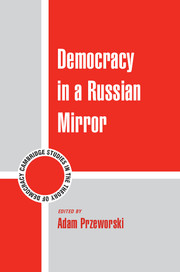Book contents
- Frontmatter
- Contents
- Contributors
- Introduction
- PART I RUSSIA
- PART II DEMOCRACY IN A RUSSIAN MIRROR
- 5 Judging Democracy as Form of Government for Given Territories: Utopia or Apologetics?
- 6 Democracy: Ancient and Modern, Good and Bad
- 7 The Role of Elections in Democracy
- 8 Elections and the Challenge of More Democracy
- 9 Democracy between Elections
- 10 General Settings, Regional and National Factors, and the Concept of Non-Western Democracy
- 11 “Non-Western Democracy” in the West
- PART III PATHS OF POLITICAL CHANGE
- Afterword: Open Issues and Disagreements
- References
- Name Index
- Subject Index
6 - Democracy: Ancient and Modern, Good and Bad
from PART II - DEMOCRACY IN A RUSSIAN MIRROR
Published online by Cambridge University Press: 05 June 2015
- Frontmatter
- Contents
- Contributors
- Introduction
- PART I RUSSIA
- PART II DEMOCRACY IN A RUSSIAN MIRROR
- 5 Judging Democracy as Form of Government for Given Territories: Utopia or Apologetics?
- 6 Democracy: Ancient and Modern, Good and Bad
- 7 The Role of Elections in Democracy
- 8 Elections and the Challenge of More Democracy
- 9 Democracy between Elections
- 10 General Settings, Regional and National Factors, and the Concept of Non-Western Democracy
- 11 “Non-Western Democracy” in the West
- PART III PATHS OF POLITICAL CHANGE
- Afterword: Open Issues and Disagreements
- References
- Name Index
- Subject Index
Summary
INTRODUCTION
The word democracy covers nowadays a variety of different meanings; it qualifies for instance at the same time political regimes like the United States, the United Kingdom, Athens in the fifth and fourth centuries BC, and, according to some generous definition, even the Kemalist Turkey. An attempt to clarify at least some of the possible different meanings of this magic word may be useful to suggest a standard helping to discuss the political system that has existed in Russia since the end of the Soviet regime. Here the approach will be historical, taking into account the history of concepts. Democracy is not only the name we give to a set of institutions but also a positively value loaded term; that is why we discuss the reasons and the limits of this normative assessment.
By and large, democracy is used nowadays as an equivalent of “good (or decent) government” without specifying among other things what is good about this form of political regime, which most of the time is not even defined at all. The usual answer that democracy is better than dictatorship is theoretically unsatisfactory, because in most of the Western countries, there is no real threat to it, and such an answer can be justified only by intellectual laziness, the one happy to repeat what Sir Winston Churchill was supposed to claim. The approach chosen here – the history of institutions and political theory – offers only some preliminary remarks that may be useful to clarify some background aspects of the general topic of the book. This chapter intends to be essentially a contribution to conceptual elucidation, and it has no ambition to suggest anything regarding the practical political problems and urgencies of the Russian Federation. John Dunn is right when he writes at the beginning of his contribution (in this volume) that a question open to discussion is “how far democracy is the appropriate criterion for political normality and political decency for the Russian Republic.”
- Type
- Chapter
- Information
- Democracy in a Russian Mirror , pp. 110 - 129Publisher: Cambridge University PressPrint publication year: 2015



